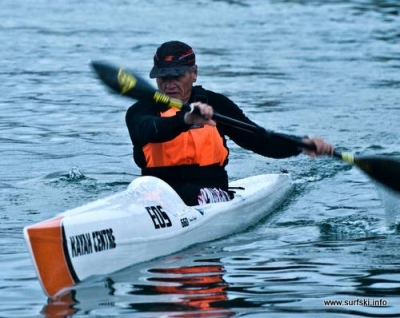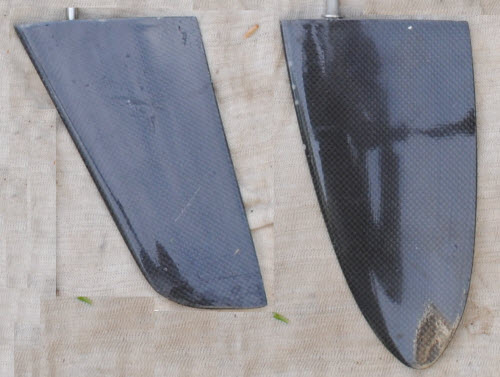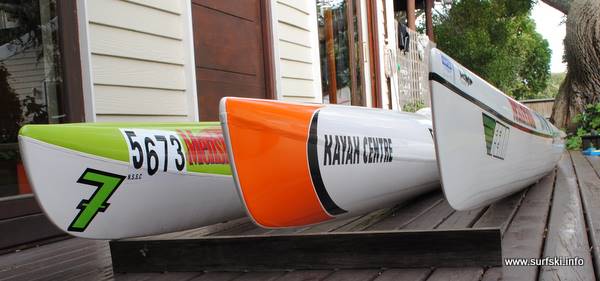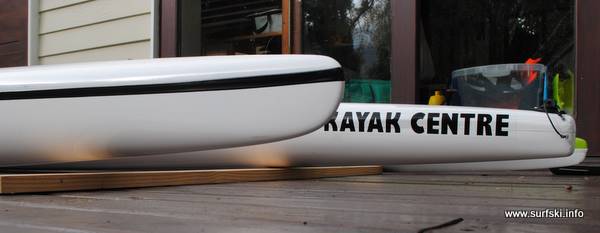The Kayak Centre EOS 660 – a 2nd opinion
 Paddling the EOS 660
Credits: www.surfski.info
Paddling the EOS 660
Credits: www.surfski.info
One of the benefits of being associated with Surfski.info is that one gets to paddle lots of new skis often before examples appear on the water or in the local paddle shops.
Love at First Sight
A few have been absolute dogs, most pretty unexceptional, but there have however been 3 skis that I have been sufficiently impressed with to place an order shortly after paddling them for the first time. The EOS is one of them. (The others were the Epic V10 - where I got to paddle one of the first preproduction prototypes - and the Red7 Surf70 Pro.) The purpose of this little diatribe is to plant the suggestion that I can spot a good ski early on.
So what’s to like about the EOS? Firstly it is nicely turned out. The finish is about the level of Fenn & Think and just little shy of the Epics ex China. The ski is resin infused and at approximately 15kg for the glass version represents very good value as a competitive ski. Its good looking with attractive decals and while I am not wild about the aesthetics of the cockpit coaming it does definitely work.
Hull Shape
One of the first things one notices when sitting in EOS is the length and narrowness of the bow. It does not have the distinctive bulge at the nose of the V10 and Red7 to create volume and lift downwind. The underside of the nose has noticeably less volume than the Red7 and the distinctive flat midsection of the Red7 is a lot softer. It has a broad tail with lots of volume that is very reminiscent of the V10. It all goes to suggest a fast ski with good speed both down and into wind.
From top: Fenn Mako Elite, Kayak Centre EOS 660, Green7
For a larger image, click here
The three skis without their rudders, flat on the deck showing the difference in rocker
The Green7 has the least rocker; the Mako Elite by far the most.
And at the back - again, Mako Elite has the most rocker, the Green7 the least.
So how does this pan out on the water?
The first thing that I noticed was that the seating position seemed nicely raised and very comfortable. This is very good for me because I am used to the V10 and feel like I am up to my elbows in Fenns which typically have very low seating and deep buckets. The ski does however feel a bit unstable as you get in but once moving you quickly discover that while the primary stability places the ski on the tippy end of the spectrum the secondary stability is good. Having now paddled the ski in a broad range of conditions and I have to say that as a mid pack paddler I was comfortable throughout. What took some getting used to is that the ski is very responsive to steering input to the point of feeling directionally unstable. However once I was settled in I found the issue went away. I should add at this point that the test ski came with a raked high aspect rudder which was pretty useless downwind. However once this was replaced with a larger elliptical rudder supplied by Kayak Centre and the problem was solved.

The two Kayak Centre rudders
What really got me going about the ski was a paddle around the 16km circuit from Fish Hoek through Simonstown and back via Roman Rock lighthouse. The wind was a gentle South East and small shallow runs started to appear on the last 5km home. I started lifting the pace to try pick up the runs and the ski seemed to come up on the plane and just stayed there as I linked from run to run. Rob who is definitely better than me downwind dropped rapidly behind in his Fenn Elite and I got the definite impression that the ski was making a very marked difference. This together with the results upwind with Rob paddling an EOS (described in his review) the previous week caused me to order my EOS the next day.
Since then I have done a lot of paddling in the EOS and have refined my opinions a little further. My particular liking is that despite its maneuverability the ski tracks well. All skis turn away from the angle of lean when rolled due to resultant hull asymmetry and the effect increases with increasing rocker. This can be helpful for steering downwind but can compromise your stroke hugely on the flat. With its low rocker the EOS runs true and does not turn away. If you are like me and do not have strong core this is a huge benefit. The fact that it achieves this while still remaining very maneuverable is hard to explain but it remains true nonetheless.
Tail Volume - Positive and Negative
The big tail volume which is so helpful in small runs turns into a handful on big ones. Rob described how Jurgen Geitner fell behind us in big swells off Hout Bay only to come past us when conditions moderated. I did a Millers Run with Rob in biggish conditions shortly after running away from him in small runs and found myself unable to keep up. The issue should not be overstated and just serves to underline the obvious point that one ski cannot be best at everything.
So all in all what are my conclusions? I think that:
- The EOS is right up there with the very best in terms of hull speed.
- It is at the tippy end of stability spectrum but is not very different from the other top end skis out there. You also need to recognize is that tippiness is in the eye of the beholder i.e. there is no absolute scale of tippiness and the rating will vary considerably from paddler to paddler depending on style.
- The ski is magnificent on the flat and in small conditions but its length and tail volume count against it in big conditions.
- The ski is well made and finished and the resin infused glass version is a great performance for money package.
My guess is that with sustained quality of manufacture and dependable supply Kayak Centre should do well with the EOS. It is certainly a very dramatic improvement on their last effort (the Illusion).
Positive Castor Rudder
I have ordered my new EOS with Johan van Blerck’s positive castor rudder system and am hoping that it might arrive in time for the weekend. Expect to see an update soon.





